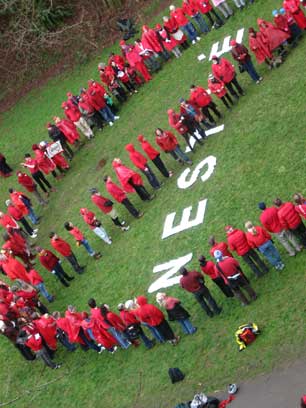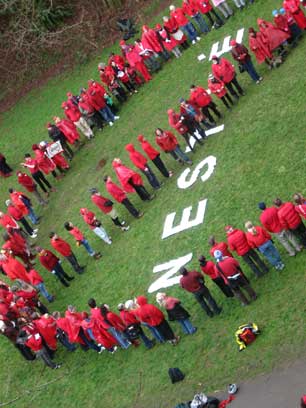 Activists convened in Portland, Oregon, on Friday to voice their opposition to Nestle’s bid to bottle water from a spring in an economically depressed town in the nearby Columbia River Gorge. (Photo: Alissa Bohling)Nestle Waters North America won’t be able to tap a spring in the city of Cascade Locks in Oregon’s scenic Columbia River Gorge for at least another two or three years, but opponents remain vocal about concerns over the multinational company’s proposal.
Activists convened in Portland, Oregon, on Friday to voice their opposition to Nestle’s bid to bottle water from a spring in an economically depressed town in the nearby Columbia River Gorge. (Photo: Alissa Bohling)Nestle Waters North America won’t be able to tap a spring in the city of Cascade Locks in Oregon’s scenic Columbia River Gorge for at least another two or three years, but opponents remain vocal about concerns over the multinational company’s proposal.
Oxbow Spring is on Oregon Department of Fish and Wildlife (ODFW) property, near a fish hatchery the state agency maintains to support embattled salmon and trout populations. The fish struggle with a mammoth dam that stands between them and the Pacific Ocean, their main food source, until they fight their way back to spawn.
Nestle is proposing to gain access to the spring via a water exchange with the City of Cascade Locks, an economically depressed town of about 1,000 people that lies about 40 miles east of Portland. Through the exchange, the city would supply the state hatchery with municipal well water in exchange for about five percent of the spring’s volume, which the city would in turn sell to Nestle.
Washington DC-based environmental group Food and Water Watch (FWW) wants ODFW to withdraw from the water exchange. FWW’s Northwest Organizer Julia DeGraw said 800 people asked the ODFW Commission to put the issue on its February agenda, so she wasn’t impressed when the meeting was canceled, especially after the public comment of the commission’s December meeting was also jettisoned despite FWW’s plans to speak then.
Since they couldn’t pack a meeting room at the state’s capitol on February 8, Food and Water Watch and other opponents of the water exchange opted for spectacle. Against the mossy backdrop of Portland’s Forest Park, about 125 people formed a giant circle and a line running sideways through the middle, their matching red T-shirts completing a familiar “busting” symbol stamped over Nestle’s name.
ODFW spokesman Rick Swart criticized FWW’s timing and approach. “What they’re asking us to do is make a political decision irrespective of the science.”
A January 2013 ODFW report said the agency will only give its final approval “if it is beneficial for fish.”
The Columbia River and the railway and interstate running alongside it are major commercial throughways flanked by steep, forested hills and canyons teeming with waterfalls and wildlife. The controversy over Nestle’s potential presence in the gorge, which would include a bottling facility and an estimated 200 truck trips per day, highlights the uneasy coexistence of nature and commerce in scenic Cascade Locks, where tourism fails to bridge the economic gap left by the decline of the timber industry. A proposal to bring a casino to the community was recently defeated, and DeGraw said the deep rifts that formed then have put a damper on the public conversation about Nestle in the community it would affect most directly.
“People are more hesitant to stick their necks out,” she said.
Nestle natural resource manager Dave Palais takes a different view. “These special interest groups have taken it upon themselves to speak for the citizens of Cascade Locks, many of whom continue to be fair and open-minded in their approach to working with us since we first came to Cascade Locks more than four years ago,” he said.
No one from the town showed up to the protest in Portland. At least five protesters came from another gorge community about 20 miles east of Cascade Locks.
Nestle, whose bottled water products accounted for 8 percent of 2011 sales that reached into the tens of billions of dollars, says the bottling plant will create up to 50 jobs. Palais says these would be benefited positions that would pay competitively based on wages for similar work.
DeGraw is skeptical. “They tend to overpromise on the number of jobs they deliver, and they tend to undersell the environmental damage that will occur,” she said. “Once they open a water bottling facility, they start shipping water from springs throughout the region. So, what’s at stake is spring water throughout the gorge.”
Nestle’s projects have met with fierce opposition in Florida, Northern California and Michigan, as well as elsewhere in the United States and internationally.
The first of three legal challenges by FWW and another environmental organization is being heard now by an administrative judge.
Studies by ODFW and another group have reportedly shown that salmonid fish can remain healthy in Cascade Lock’s municipal well water, which the hatchery would receive in the summer, and Swart said the swap is considered a boon since it would allow the hatchery to grow more fish at a time when the spring’s volume is lowest.
ODFW’s January 2013 report says that in addition to considering the water exchange’s effect on fish, the agency would drop the deal if it concludes it would cause other ecological damage. However, Swart said no assessments of other potential environmental outcomes are currently underway or in the works at the agency.
Join us in defending the truth before it’s too late
The future of independent journalism is uncertain, and the consequences of losing it are too grave to ignore. To ensure Truthout remains safe, strong, and free, we need to raise $27,000 in the next 24 hours. Every dollar raised goes directly toward the costs of producing news you can trust.
Please give what you can — because by supporting us with a tax-deductible donation, you’re not just preserving a source of news, you’re helping to safeguard what’s left of our democracy.
